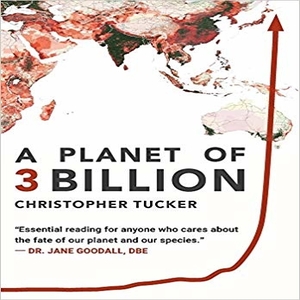A Planet of 3 Billion


“A Planet of 3 Billion”
Speaker: Tucker, C. (American Geographical Society)
Date: 31 October 2019
Speaker Session Preview
SMA hosted a speaker session presented by Dr. Christopher Tucker (American Geographical Society) as a part of its SMA General Speaker Series. Dr. Tucker began by speaking about the growth of the human population over the past 100,000 years. He explained that the world population remained at less than one million people until the advent of farming and organized agriculture, after which the world population reached about 170 million people. The world population remained relatively stagnant during the first millennium (AD) until the Industrial Revolution, which marked the beginning of the exponential population growth that humans are still witnessing today. Dr. Tucker then asked, “At what point does the Earth become unstable? How many people can the Earth support?” He stated that most scientists do not discuss the implications of exceeding Earth’s carrying capacity; the primary focus is on carbon footprints rather than human footprints. He then presented a series of maps which illustrated the detrimental effects of human-induced climate change and the potential for it to destroy many of Earth’s valuable ecoregions. Each ecoregion is geographically unique, and if it is destroyed or loses the ability to sustain life, it will be gone forever. Dr. Tucker also discussed how the industrialization of the global landscape and the geography of human waste affect the human footprint. He then defined shifting baseline syndrome. Humans suffer from this syndrome when they do not have access to first-hand information or experiences that make them realize how something has changed (e.g., the Earth). He also discussed several ways in which humans can bend the population curve, including through women’s empowerment, women’s education, women’s integration into the work force, and access to family planning technologies. To conclude, Dr. Tucker explained how decision makers can factor the rapidly increasing world population and its effects into the development of US policies and strategies. He stated that the US Department of Defense should identify indicators and warnings related to Earth’s carrying capacity, pay ecological debt immediately, devise strategies to empower women worldwide, and combat the shifting baseline syndrome with spatiotemporal data.
Speaker Session Audio Recording
To listen to an audio recording of the session, please email Ms. Nicole Omundson (nomundson@nsiteam.com).
Christopher Tucker
CHRISTOPHER TUCKER has spent the last two decades at the intersection of technology, strategy, geography and national security as an innovator, investor, social entrepreneur, author, and strategic advisor to the US national security community. As Chairman of the American Geographical Society, he launched a multi-year strategic dialog known as Geography2050, focused on the vital trends that will reshape the geography of our planet over the coming decades. As the creator of MapStory.org, he pioneered the democratization of spatio-temporal data, and its use to understand our rich past, our complex present, and our uncertain future. He has served on a wide variety of public sector, corporate, and non-profit boards including the Defense Science Board Intelligence Task Force, the Director of National Intelligence's Strategic Studies Group, the Secretary of Interior’s National Geospatial Advisory Committee, the United States Geospatial Intelligence Foundation, and the Open Geospatial Consortium. He holds a BA, MA, and PhD from Columbia University. His passion for geography and the fate of future generations animates this work.
